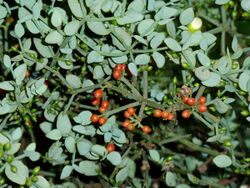Biology:Viscum rotundifolium
From HandWiki
Revision as of 03:43, 21 July 2021 by imported>MainAI5 (linkage)
Short description: Species of flowering plant
| Viscum rotundifolium | |
|---|---|

| |
| Scientific classification | |
| Kingdom: | Plantae |
| Clade: | Tracheophytes |
| Clade: | Angiosperms |
| Clade: | Eudicots |
| Order: | Santalales |
| Family: | Santalaceae |
| Genus: | Viscum |
| Species: | V. rotundifolium
|
| Binomial name | |
| Viscum rotundifolium L.f.
| |
| Synonyms | |
| |
Viscum rotundifolium, the red-berry mistletoe, is a variable, wide-ranging and monoecious mistletoe of southern Africa.[1] It is a hardy, evergreen hemiparasite with a catholic variety of host plants,[2] including other mistletoes.[3] It may be found from near sea level to 1,950 m.[1] Its fleshy, leathery leaves are dark[2] or pale green and variable in shape, though usually broadly ovate to elliptic.[4] While its creamy-green flowers are small and inconspicuous, the fruit are a brilliant, shiny orange-red colour when ripe.[2] It is similar to V. schaeferi Engl. & K.Krause and V. pauciflorum L.f. with which it may be confused.[1]
References
- ↑ 1.0 1.1 1.2 "Viscum rotundifolium L.f.". African Plant Database. Conservatoire et Jardin botaniques & South African National Biodiversity Institute. http://www.ville-ge.ch/musinfo/bd/cjb/africa/details.php?langue=an&id=123698. Retrieved 11 February 2013.
- ↑ 2.0 2.1 2.2 Trees and Shrubs of the Witwatersrand. Johannesburg: Witwatersrand University Press. 1974. pp. 294–295. ISBN 0-85494-236-X.
- ↑ R.M. Polhill, D. Wiens. "Viscum rotundifolium L.f.". Flora Zambesiaca: volume:9 part:3 (2006) Viscaceae. Kew. http://apps.kew.org/efloras/namedetail.do?flora=fz&taxon=11942&nameid=30909. Retrieved 11 February 2013.
- ↑ "Viscum rotundifolium L.f.". Namibian Plants. kyffhauser.co.za. http://www.kyffhauser.co.za/Plants1/Viscum_rotundifolium/Index.htm. Retrieved 11 February 2013.
External links
- Viscum diversity in southern Africa, iziko museums
Wikidata ☰ Q7935897 entry
 |

